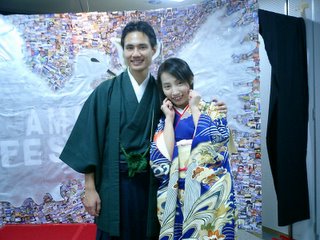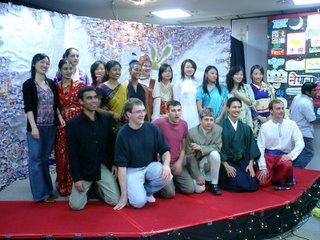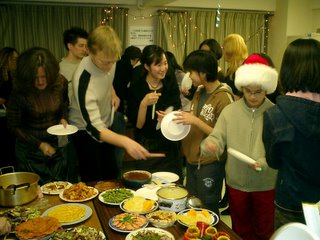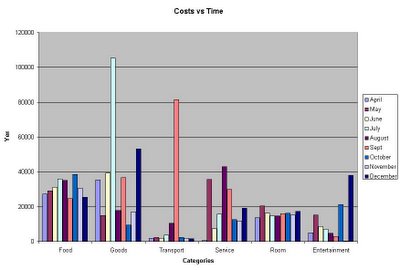I have reviewed my old new year's resolutions from last year... I've ripped the post and inserted below in grey below this post. I am glad to say that I have achieved the main objective of last year-- to get a good organizer.
I have an organizer for the computer that I swear by now. It's called Rainlendar and I've been using since October (and it's free too). It displays a 1 month calendar and shows what you have planned for the next 7 days, in addition to keeping a todo list on the side. As a result, I am able to quickly look ahead to see what is comming up, or look back to see what I have done. It can also run off a server (you can save your schedule on a different computer and access your lists from that computer).
As for my resolutions this year, I will list them below:
- Complain less, do more (take more self-responsibility)
- Set personal duedates for things that need to be done
- Alot 1~2 hours/day as personal time
It has come to my attention that I believe that complain too much (or have a tendency to be a little unsatisfied about many things). As of comming to Japan, I was first impressed by many things... unfortunately I haven't been quite disappointed by other things (and I deal with it on a continuing basis). I have reviwed some of my older posts and realized that I often dwell on many things that I find ineffective, gripe about why it is ineffective and then get a little disheartened at why things cannot be improved. This is not a very productive outlook and dangerous water to tread.
As a teacher at heart, it is my natural inclination to help others and share information. The problem is that I have become more and more indiscriminate in trying to improve things that others don't believe to be a problem and hence good intentions might be running into conflict with others or culture in general. In conclusion, I should not feel so responsible for the effectiveness of everyone or everything else. What is important is that I focus more on myself. If what I do works, then it'll show. If they want to learn it, then I'll be happy to teach. The emphasis is on the doing.
On personal duedates:
I had an interesting realization a few weeks ago when I was preparing for my seminar on Lapace transforms and frequency filters. I was deadset on trying to do so something completely different from the standard seminars done here-- I wanted a working demonstration of the presented theory in action. I had 3 days to get it working starting from a Wedensday to get it ready for a Saturday presentation.
When there is a will, there is a way. Without thinking, a 3 day plan was hashed out. I had planned to get the theory presentation down on Wedensday and Thursday afternoon. Thursday evening and Friday was for circuit construction. It was fortunate that I started early on the circuit because it turns out that the lab was short some parts which I had to buy. I would have never made it if I just decided to start on the Friday.
After that event, I realized that a drive to want to do something and setting a duedate to get something done is crucial to get things to materialize, else it's only good as a dream. Now the next trick is learning how to deal with planning a discovery based project, har har.
On personal time:
People here work long hours, it seems like they have never ending responsibilites or things to do. They work long hours and have no time to themselves. I ask them sometimes, what other interests do they have... unfortuately I haven't heard many answers. As for me, I'm starting to forget what my other interests were as more and more time is being gobbled up by lab.
To me, it's just healthy to make time to do other things. Things like reading, practicing writing (espcially in Japanese), exercising and pursuing other personal goals. It's not about getting a life, it's about keeping a diversified life.
Anyways, it feels like I've been aimlessly babbling so I'll end it here for now!
Last years Resolution post (from old blog):
New Years is a time of a new start and it is important to start off correctly. There is a lot I need to do and tradionally I'm pretty damn disorganized. So effective immediately, I am going to try and become more organized. If you want to know how bad I am, I bought a calendar in June and hung it on my wall-- the month is still sitting at August (I am sometimes hopeless when it comes to organization).
I am seriously looking for a computer based day/project planner. Recommendations are definately welcome. Something that can keep track of current/pending projects, task
management and a progress tracker would be awesome. Anything that can keep track of time frames of a month to half a year would be great. I have poked around a little but my hunt continues for the perfect planner... if worse come to worse, I'll consider programming my own :)
I took a look back at my 2004 New Years resolution and sadly the important resolutions were not entirely realized this year. A quick recap (copy paste from archive...):
Resolution #1: Remember to write 2004 from now on.
Resolution #2: Start executing projects off my todo list that I've been putting on hold for so long (some of my project ideas are several years old!)
Resolution #3: Organize and Prioritize! Fatal character flaw is that I always bite off more than I can chew. Gotta get a better way of keeping track of everything I'm up to else I'm going to over commit my resources and fry.










